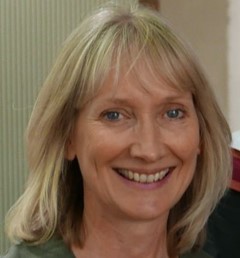Biography:Catherine Nobes
Catherine D. Nobes | |
|---|---|
 Catherine Nobes | |
| Born | 1 April 1964 |
| Alma mater | University College London University of London |
| Scientific career | |
| Institutions | University College London University of Bristol |
Catherine D. Nobes (born 1 April 1964) is a Professor of Cell Biology and Head of School of Biochemistry at the University of Bristol. She studies the regulation of cell migration and invasion of cancer cells by Eph receptors.
Early life and education
Nobes went to school at Windsor Girls' School and was a county level high jumper as a teenager[citation needed]. She studied biochemistry at the University of London.[1] She completed a PhD at the University of Cambridge, working with Martin Brand. Nobes did brief Post-Docs in Helen Saibil and Aviva Tolkovsky's labs in Oxford before joining Alan Hall's laboratory at the University College London, where she identified the role of the GTPase CDC42 and effectors in forming actin-rich filopodial extensions.[1][2] She investigated the regulation of actin polymerisation and how cell movement determines polarity and adhesion.[3][4] She was awarded a Lister Institute of Preventive Medicine Fellowship in 2007, which allowed her to study cell migration in the context of axonal guidance and cancer metastasis.[1][5]
Research and career
Nobes was awarded a Medical Research Council Fellowship at University College London in 2001, where she worked in the Laboratory for Molecular Cell Biology (LMCB).[1][6] Her work was featured in a Wellcome Trust exhibition of art and science, Growth and Form.[7][8] She joined the University of Bristol as a Reader in 2006, and was promoted to a Professor of Cell Biology in 2012.[1] She delivered her inaugural lecture in 2014, discussing cell migration and metastasis of cancer cells.[9] Since 2014 she has been the head of the School of Biochemistry, the first woman to do so in the School's 50-year history.
Her work largely considers the social behaviour of tumor cells in the tumor microenvironment.[10] She studies how colliding cells that come in to contact with each other stop migrating toward their partner, repolarise and move away from one another - a process known as contact inhibition of locomotion.[10] She has studied how this cell behaviour is regulated by Eph-ephrin signalling.[11] Eph receptors are part of the receptor tyrosine kinases; with two main families - EphA and EphB.[12] Nobes showed that in metastatic prostate cancer cells, EphB receptors are misregulated in ways that might lead to cancer cell invasion / metastasis.[10] She showed that similar activation of Eph signalling may underpin epithelial cell loosening during wound healing.
Academic service
Nobes has served on the grant allocation board of the Royal Society.[13] She was the editor of the British Society for Cell Biology newsletter.[14] In 2018 she joined the Advisory Committee of the Lister Institute of Preventive Medicine.[15]
References
- ↑ 1.0 1.1 1.2 1.3 1.4 Bristol, University of. "2014: outputurl-86374-en. | School of Biochemistry | University of Bristol" (in en-GB). https://www.bristol.ac.uk/biochemistry/news/2014/outputurl-86374-en.html.
- ↑ Self, A.; Etienne-Manneville, S. (2015-06-18). "Alan Hall (1952-2015), an Englishman in New York". The EMBO Journal 34 (13): 1735–1736. doi:10.15252/embj.201570020. ISSN 0261-4189. PMID 26089021.
- ↑ Jockusch, Brigitte M. (2017-01-03) (in en). The Actin Cytoskeleton. Springer. ISBN 9783319463711. https://books.google.com/books?id=6y3VDQAAQBAJ&q=Kate+Nobes&pg=PA161.
- ↑ Hall, Alan; Nobes, Catherine D. (1999-03-22). "Rho GTPases Control Polarity, Protrusion, and Adhesion during Cell Movement" (in en). The Journal of Cell Biology 144 (6): 1235–1244. doi:10.1083/jcb.144.6.1235. ISSN 1540-8140. PMID 10087266.
- ↑ (in en) Regulators and Effectors of Small GTPases, Part D: Rho Family. Elsevier. 2000-10-11. ISBN 9780080496801. https://books.google.com/books?id=NvcsETBw0o8C&q=Kate+Nobes&pg=PA449.
- ↑ UCL (2015-09-30). "Alumni" (in en). https://www.ucl.ac.uk/lmcb/alumni-0.
- ↑ "Beautiful science inspires artists" (in en-GB). 2001-02-28. http://news.bbc.co.uk/2/hi/science/nature/1192358.stm.
- ↑ Science, American Association for the Advancement of (2001-03-09). "NetWatch: Best of the Web in science." (in en). Science 291 (5510): 1865. ISSN 1095-9203. http://science.sciencemag.org/content/291/5510/netwatch.
- ↑ Bristol, University of. "Professor Kate Nobes - inaugural lecture | Public and Ceremonial Events Office | University of Bristol" (in en-GB). http://www.bristol.ac.uk/pace/public-events/inaugural/2014/nobes.html.
- ↑ 10.0 10.1 10.2 Bristol, University of. "Professor Catherine Nobes - Biochemistry" (in en-GB). http://www.bris.ac.uk/biochemistry/people/catherine-d-nobes/index.html.
- ↑ BATSON, J.; ASTIN, J.W.; NOBES, C.D. (2013-03-15). "Regulation of contact inhibition of locomotion by Eph-ephrin signalling". Journal of Microscopy 251 (3): 232–241. doi:10.1111/jmi.12024. ISSN 0022-2720. PMID 23495724.
- ↑ Nobes, Catherine D.; Campbell, Jessica; Taylor, Hannah (2017-02-06). "Ephs and ephrins" (in English). Current Biology 27 (3): R90–R95. doi:10.1016/j.cub.2017.01.003. ISSN 0960-9822. PMID 28171762.
- ↑ "Kate Nobes | Royal Society" (in en-gb). https://royalsociety.org/people/kate-nobes-12676/.
- ↑ administrator. "BSCB Newsletter, Winter 2013 | British Society for Cell Biology" (in en-US). https://bscb.org/winter-newsletter-2013/.
- ↑ "The New Lister Institute Scientific Advisory Committee". 2018-05-20. https://www.lister-institute.org.uk/the-new-lister-institute-scientific-advisory-committee/.
 |

